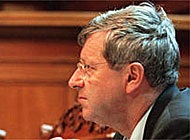
Swiss politicians on charm offensive in Europe

Swiss parliamentarians have embarked on a tour of European Union capitals in a bid to improve the country's image in the eyes of decision-makers. The trip comes amid concerns that there is growing impatience and indifference towards Switzerland in the EU.
The delegation of four parliamentary deputies were in Paris on Wednesday for talks with members of the French Parliament, the Assemblée Nationale. Other delegations are to travel to Berlin and Vienna in the coming weeks, and to Brussels after the summer break.
There is no set agenda for what Anton Cottier, a senator and member of the delegation, calls “an exchange of ideas”. He says the Swiss are keen to explain to their EU counterparts how Swiss democracy works, and what the key elements of Switzerland’s policies towards the European Union are.
“European governments are usually well aware of our positions, but this is less the case with parliaments,” Cottier told swissinfo.
It is no coincidence that three out of the four parliaments that the deputies want to visit have not yet ratified a bilateral agreement concluded in 1999 between Switzerland and the EU. In Belgium, a crucial vote over the issue will be held on Thursday in the upper house of the federal parliament, the Senate.
The other European parliaments that have held back ratification of a Swiss-EU treaty on the free movement of people are the French Assemblée Nationale and the German Bundestag. The treaty is part of a package of seven agreements covering issues such as transport and research policies.
The treaty governing the free movement of people is the only one which needs to be ratified by each of the EU’s national parliaments, but implementation of the entire package of bilateral agreements hinges on its adoption.
The bilateral agreements were expected to be in force by January this year, following their approval by the Swiss parliament and the public in a referendum in May 2000. Switzerland has already implemented its commitments, such as abolishing a weight limit for heavy trucks on Swiss roads.
Some of the strongest opposition to ratifying the treaty comes from a cross-party pressure group in the Belgian parliament. It has threatened to stall ratification until the Swissair Group, has made good on its commitment to buy 85 per cent of the shares of Belgium’s troubled state-owned carrier, Sabena. Swissair Group, itself in financial trouble, currently holds 49 per cent of the shares.
Jacques d’Hooghe, a Christian Democrat from Flanders and the senator behind the Belgian opposition to the “Swiss treaty” as it is known, refutes any suggestion that he is being anti-Swiss. “I love the country,” he told swissinfo. “My considerations are purely commercial.
“Swissair made its commitment on condition that the EU grants it full landing rights throughout its territory in its agreements with Switzerland. We merely turn the issue around – bilateral agreements yes, but then Swissair can’t opt out of its commitments either,” d’Hooghe says.
The Belgian foreign minister, Louis Michel, has described the opposition to the “Swiss treaty” as “childish”. “You don’t treat a country like this”, he is reported to have said.
But d’Hooghe says his cause is gathering support and has “a fair chance” to carry the day in the Assemblée (Belgian’s lower house of parliament) even if it fails in the Senate on Thursday.
A foreign affairs journalist at Belgium’s daily “Le Soir”, Edouard Van Velthem, says it is possible that a feeling is growing in Europe that Switzerland is “rich, alone and obsessed with its bank vaults. But these are clichés, and I wouldn’t go as far as saying that it constitutes anti-Swiss sentiment.”
But a diplomat based at Switzerland’s mission with the EU in Brussels said recently that negotiations with EU officials had become more difficult over the years. “We are out of the loop, and with the EU’s eastern expansion, Switzerland matters that much less to officials and politicians alike.”
Another issue complicating bilateral relations is Switzerland’s banking secrecy laws. They have recently come under attack in political circles across Europe, but Switzerland’s finance minister, Kaspar Villiger, has continually reiterated that they are “not negotiable”. The EU wants to harmonise its capital tax laws and would like Switzerland to fall in line.
Earlier this year, the EU hinted that a planned round of negotiations about a second package of bilateral treaties with Switzerland might depend on Bern first putting a stop to Swiss bank accounts being used for tax evasion.
Brussels also wants Switzerland to improve its record on preventing cross-border crime such as cigarette smuggling.
Cottier says the Swiss parliamentary delegation wants to address sensitive issues in its talks with French parliamentarians – especially banking secrecy laws.
He says this is another area in which “Europeans don’t know enough about Swiss democracy”, referring to the requirement that Swiss voters would have to approve the abolition of banking secrecy laws even if the government and parliament were to agree that they be dropped.
Three out of four Swiss are against the abolition of the country’s banking secrecy law according to opinion polls.
by Markus Haefliger

In compliance with the JTI standards
More: SWI swissinfo.ch certified by the Journalism Trust Initiative

























You can find an overview of ongoing debates with our journalists here . Please join us!
If you want to start a conversation about a topic raised in this article or want to report factual errors, email us at english@swissinfo.ch.